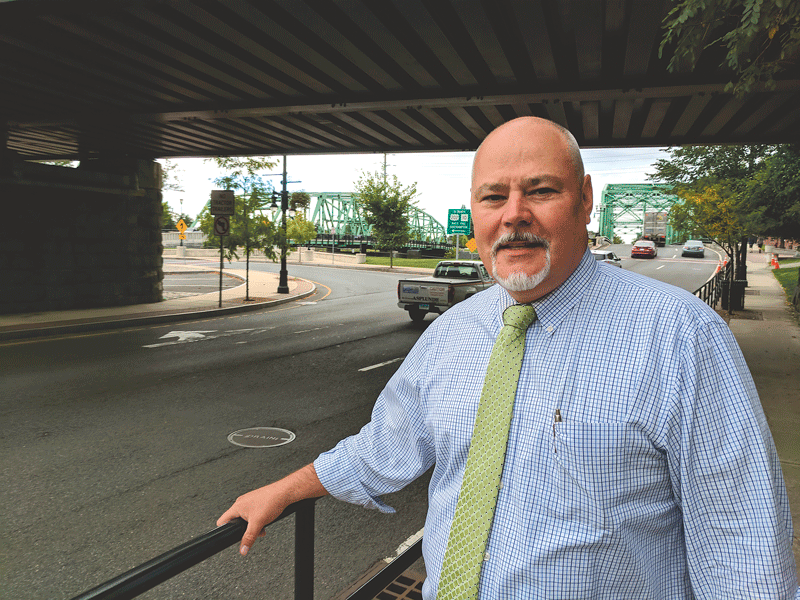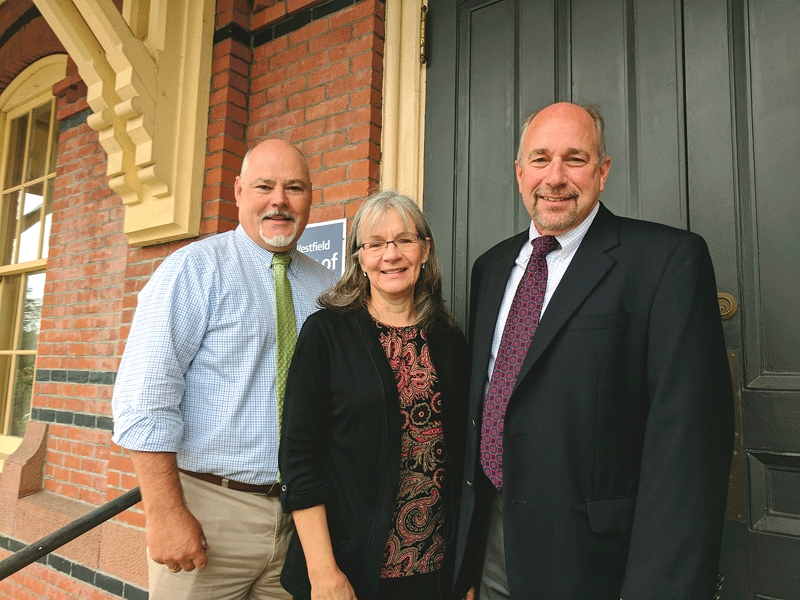Westfield Thrives by Making Solid Connections
Community Spotlight

Mayor Brian Sullivan says his coffee hours with business owners and managers, a chamber of commerce initiative, have been eye-opening and extremely productive.
By the middle of 2018, Dan Howard says, close to 75% of Westfield residents and businesses will have access to high-speed Internet through Whip City Fiber, a division of Westfield Gas + Electric.
“The Municipal Light Board is fully behind it, as is the City Council,” said Howard, general manager of WG+E, adding that the city began funding the project back in 2014. “It’s a great collaboration that has really benefited the entire city.”
He noted that of the 41 municipal electric utilities in Massachusetts, only four are gas-and-electric entities, and only one of those four, once Westfield’s project goes online, will also provide high-speed Internet. The city will join communities like Wilson, N.C., Chattanooga, Tenn., and Longmont, Colo., as ‘gigacities,’ and will be able to showcase that fact in its marketing efforts to draw more business to town.
“You don’t have to be big manufacturer or a warehouse facility; we’re also providing access to small, upstart entrepreneurs,” he said. “People can work out of their homes and get the Internet access they need. This provides hefty benefits to communities and has proven to be an economic boost.”
Although it’s perhaps the most literal example, Whip City Fiber is just one way Westfield is making connections — between its municipal leadership, business community, residents, and educational facilities.
Take, for example, the Westfield Education to Business Alliance, which connects the city’s schools, where students are beginning to contemplate their career paths, with companies that are eager to mine local talent.
“That has gone over like gangbusters,” said Kate Phelon, executive director of the Greater Westfield Chamber of Commerce, explaining that it began last year with 15 core members and now regularly draws participation from 40 to 45 businesses.
“It’s all about workforce-development issues,” she told BusinessWest. “We’re bringing education to businesses and businesses to education. The response has been fabulous. It’s a great collaboration.”
For example, a career fair at Westfield High School in June attracted some 45 businesses, interacting with 600 students who gained exposure to the types of career opportunities available at local companies — and, more important, what skill sets they will need to take advantage of them.
That’s not all; Westfield businesses have visited elementary schools as well, and in two weeks, the collaborative will present a career fair for some 120 teachers, who will meet with local businesses and hear about their workforce challenges, with an eye toward modifying curriculum to prepare students for jobs in the regional economy.
Meanwhile, Westfield State University’s Pathways to Excellence program allows high-school students to graduate with up to nine college credits, while exposing them to career options they can think about before taking the leap to college.
“We’re working together on the future workforce, whether students choose the college path or the work path,” Phelon said. “It’s been phenomenal.”
Westfield at a glance
YEAR INCORPORATED: 1669
POPULATION: 41,094 (2010)
AREA: 47.4 square miles
COUNTY: Hampden
RESIDENTIAL TAX RATE: $19.42
COMMERCIAL TAX RATE: $37.08
MEDIAN HOUSEHOLD INCOME: $45,240
MEDIAN FAMILY INCOME: $55,327
TYPE OF GOVERNMENT: Mayor, City Council
LARGEST EMPLOYERS: Westfield State University, Baystate Noble Hospital, Savage Arms Inc., Mestek Inc., Advance Manufacturing Co.
* Latest information available
Meanwhile, the Mayor’s Coffee Hour, a chamber initiative launched several years ago, still draws some 30 to 40 attendees each month to a different host business, where Mayor Brian Sullivan takes questions on the state of various economic-development initiatives in the city.
“Some of these businesses have never been visited by local government,” Sullivan said. “We talk about what they need, how can we help — and it has been really productive. They might let us know they have jobs open, but find the talent, and we can hook them into other people we know, and the connections Kate has.”
Taken as a whole, these initiatives and others speak to a growing sense that Westfield aims to grow through open communication and productive connections. And those efforts are certainly bearing fruit.
Higher Gear
Over the past few years, Westfield residents have been able to see some long-percolating developments blossom, most notably the $6.6 million Olver Transit Pavilion, which opened in April as the centerpiece of a planned downtown resurgence. The Westfield Redevelopment Authority also recently demolished a former bowling alley near the transit center, with plans to create a multi-story, mixed-use building with retail, restaurants, office space, and market-rate apartments.
Those projects are just two facets of the Elm Street Urban Renewal Plan approved in 2013, which focuses on revitalizing 4.88 acres in a two-block area in the heart of downtown Westfield running along both sides of Elm Street, the city’s main commercial thoroughfare. The city has also directed funding to revitalize the so-called Gaslight District adjacent to it.
The transit center was designed to both catalyze related economic development and increase the use of public transportation. The state-of-the-art center includes parking space for four buses with bicycle racks, as well as a bicycle-repair station, which speaks to the proximity of the Columbia Greenway Rail Trail only a block away.
The trail, which spans three and a half miles and crosses seven bridges in the city, isn’t yet complete, Phelon said, but will eventually be yet another destination drawing people to the Whip City.

Mayor Brian Sullivan, Kate Phelon, and Dan Howard say collaborations between Westfield’s municipal leaders, businesses, and schools have reaped benefits for the city.
“In a few years, it will be an economic engine in the city,” she told BusinessWest. “People from will come to this rail trail because it’s elevated and extends all the way down to New Haven. I’m already getting calls about where people can park overnight and bike down to Connecticut.”
Economic development has taken other forms as well. Westfield opened a $6 million solar farm on Russell Road last year, featuring 8,864 solar panels capable of producing 3 megawatts of power that will be consumed by the community. Meanwhile, the city continues to develop a second industrial park on city-owned land adjacent to Barnes Regional Airport.
Sullivan said Westfield already offers a number of advantages to businesses considering locating there, from plenty of available land to easy access to Interstates 90 and 91, rail service, and Barnes, to a permitting system that gets all players, from planners to the DPW to the WG+E, into the same room to ease the path to approval.
“That has been successful. There’s no sense in having a meeting to set up a meeting to talk about another meeting. Here, it’s a one-stop shop.”
But he also takes a regional approach to economic development, maintaining relationships with area mayors and the Economic Development Council of Western Mass. “We’re on the the same page, because we’re only as good as our neighbors are doing.”
And Westfield is doing well, he added, noting that city-wide high-speed Internet is just one more catalyst to transform the Whip City from a warehousing and manufacturing center to a location that’s amenable to businesses of all kinds, large and small.
“We have a tremendous asset in this municipal utility,” Howard said, “but instead of everyone doing their own thing, the mayor and I and Kate get together to promote the synergies we have.”
Local Impact
Chambers of commerce are, by their nature, about economic development and helping their communities grow, Phelon said. The Greater Westfield Chamber continues to do so by way of programs such as a buy-local initiative that encourages businesses in the city to make purchases from other Westfield businesses instead of looking outside the area, or online, for suppliers.
“We worry about the future of retail; no matter what you buy, online shopping is hitting Main Street, USA hard,” she said. “We’re trying to counteract that; we’re asking, ‘why don’t you consider a chamber member? You might find something you didn’t even know was available here.’ We’re excited about this. Instead of going online, maybe spend an extra dollar or two here, and make an impact locally. We really want to push this hard.”
It comes down to communication, Sullivan said, and the various entities that make a community run smoothly — from City Hall to the schools system to the business ecosystem — understanding each other’s needs and challenges.
Even last spring’s Earth Day cleanup of trash on Servistar Industrial Road qualifies, the mayor said, adding that it was a volunteer effort spurred by people getting together to talk about a problem. “It’s simple,” he said, “but if you don’t know about it, you can’t do anything about it.”
In Westfield, though, word gets around. And, thanks to a certain fiber project, it’s about to get around even faster.
Joseph Bednar can be reached at [email protected]






